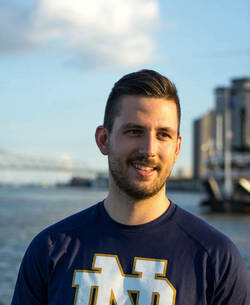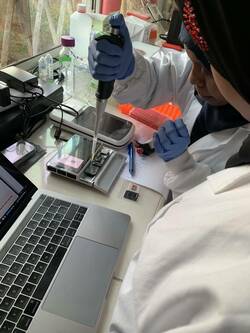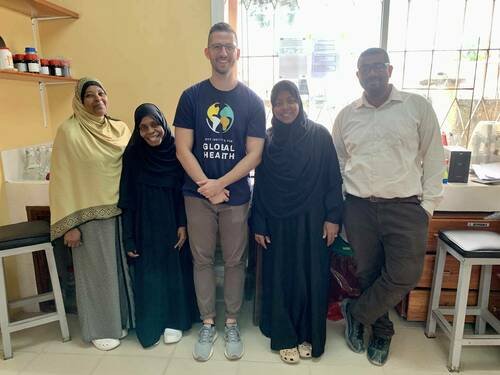
Aurel Holzschuh is a current graduate fellow of the Eck Institute for Global Health (EIGH). He has a BSc in Biology from the University of Basel, Switzerland, an MS in Infection Biology from the Swiss Tropical and Public Health Institute, and he is actively working on his PhD in Biological Sciences from the University of Notre Dame. In this Q&A, Aurel discusses his current malaria research with the Koepfli lab and his future aspirations in infectious disease research.
Q. Tell us a little bit about your area of study. How and when did you first become interested in the field?
A. I am a member of the Koepfli lab, where I use molecular tools to better understand the epidemiology of malaria and use these findings to develop new strategies for malaria diagnosis, control, and elimination. I have always been interested in science in general, but biology has always been my favorite area. In college, I first became interested in infectious diseases-especially in poverty-related diseases like malaria. After graduating, I went to the Swiss Tropical and Public Health Institute to pursue a master’s degree in Infection Biology, where I started working on Plasmodium parasites, the causative agent of malaria. I was amazed by the complexity of the disease and how multifaceted it is and inspired to continue doing malaria research through a PhD in the Department of Biological Sciences at Notre Dame.
Q. Why did you choose to get involved with the Eck Institute of Global Health?
A. I chose the Eck Institute because I am not only passionate about infectious diseases, but also about global health overall. The Eck Institute for Global Health aims to improve health standards and reduce health disparities for all by promoting research, training, and service. I wanted the opportunity to interact with colleagues that study and work on finding solutions to a variety of global health issues within the Biological Sciences department but also beyond it. My time as a global health fellow has allowed me to devote much more time to my research and provided me with the resources and opportunities to hopefully make important contributions to my field and the larger mission of the EIGH.
Q. What are you currently working on, and what do you hope to accomplish with it?

A. My research involves assessing population genomic data to guide our understanding of malaria epidemiology. Concretely, my project focuses on Zanzibar, a pre-elimination setting, where progress towards malaria elimination has stalled recently despite access to efficacious antimalarial treatment and good vector control measurements. Decreasing transmission intensity in Zanzibar has led to increasing spatial and temporal heterogeneity in malaria transmission, but the drivers of this heterogeneity are poorly understood. I use genotyping methods in conjunction with epidemiological data to assess transmission networks, identify sources and sinks of infections, and monitor markers of drug resistance. I work closely together with the Zanzibar Malaria Elimination Programme (ZAMEP) to identify and classify the remaining foci to effectively target interventions. However, the need for advanced laboratory infrastructure, often not available in sites where malaria transmission occurs, prevents the rapid generation and utilization of genotyping data. To overcome this limitation, I have developed genotyping protocols for P. falciparum sequencing in endemic sites using a mobile lab centered around a portable sequencer. For the last part of my Ph.D., I will soon go to Zanzibar and evaluate the feasibility and applicability of in-country genotyping in Zanzibar in close collaboration with ZAMEP. Together with local researchers, I will discuss how genotyping data best feed into the surveillance-response decision-making procedures. This pilot study is the first step in generating genomic data in Zanzibar and will hopefully enable ZAMEP to inform its surveillance and response efforts, as well as optimize and evaluate the interventions currently deployed in Zanzibar.
Q. What is one of your favorite classes and why?
A. Although not a traditional class, I have to say the Global Health Colloquium. I really enjoy hearing from Eck’s community of passionate scholars and all the great research everybody is doing. I also think it is important to improve my ability to communicate my work with others outside of my immediate discipline.
Q. Do you have any plans for the future? If so, what are they?
A. In the long term, I hope to find a position where I can continue molecular epidemiological and genomic research of infectious diseases and use this research to make meaningful improvements in people’s lives. In the near future, I plan to defend my dissertation, graduate, drink a beer, go hiking in my beloved Swiss mountains, and keep moving forward in my career.

Holzschuh in the lab in Zanzibar with four lab technicians from the Zanzibar Malaria Elimination Programme
Originally published by at globalhealth.nd.edu on November 10, 2022.